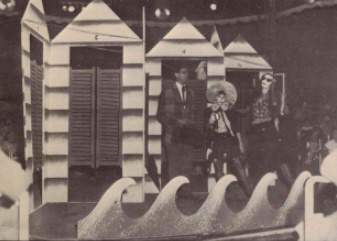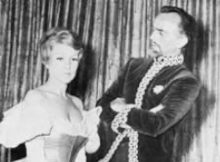"The Fantasticks"
- Music by Harvey Schmidt - Book and Lyrics by Tom Jones
- Based on Les Romanesques by Edmond Rostand
- Opened May 3, 1960 at the Sullivan Street Playhouse. Closed January 13, 2002. 17,162 performances.
- Performed at the Music Circus July 4 thru July 9, 1967
"Finian's Rainbow"
- Music by Burton Lane - Lyrics by E. Y. Harburgh - Book by E. Y. Harburgh and Fred Saidy
- Opened January 10, 1947 at the 46th Street Theatre. Closed October 2, 1948. 725 performances.
- Performed at the Music Circus August 28 thru September 11, 1951
- Performed at the Music Circus July 13 thru July 25, 1954
- Performed at the Music Circus July 26 thru July 31, 1960
- Performed at the Music Circus July 30 thru August 4, 1968
A highly original story unfolds, at once magical and all too real. Woody and Sharon fall in love ("Old Devil Moon"). Finian secretly buries the crock. The sheriff is about to throw all the citizens of Rainbow Valley off their land for violating his "law of the south, namely:" Whites and Blacks cannot work or live side by side. Sharon is outraged, and wishes that the Senator could be Black and feel the terrible pain of racism. And because, without knowing it, she is standing over the buried crock, it happens! The Senator turns Black—the crowd is stunned—he is horrified, and runs off into the forest to hide.
The sharecroppers learn there is gold in Rainbow Valley—though no one except Finian knows where it is. They are thrilled ("When the Idle Poor Become the Idle Rich") and go offstage to celebrate. Susan enters, alone. As she dances in the forest, magic seems to draw her to the place where Finian buried the gold. She digs it up. Amazed and enchanted, she dances holding the crock, then buries it in a different spot. As she dances off, Og enters, and soon after, a hungry, lonely, frightened "Black" Senator stumbles on stage. Og casts a spell to cure the Senator of his bigotry!
The Senator leaves, Susan returns, Og falls madly in love with her and sings his tour-de-force, "When I'm Not Near the Girl I Love (I Love the Girl I'm Near)." Meanwhile, Sharon, accused of witchcraft for turning Rawkins Black, is about to be burned at the stake. But at the last minute, there are happy endings for all: Sharon and Woody marry; the Senator is warm and tolerant (and is running for office); Susan can speak; she and Og are a happy couple. And Finian goes on his way, taking his rainbow of hope to others who need it.
"Firefly"
- Music by Rudolf Friml - Lyrics by Otto Hauerbach - Book by Otto Hauerbach
- Opened December 2, 1912 at the Lyric Theatre (moved to Casino Theatre December 30,1912) and ran for 120 performances.
- Performed at the Music Circus June 17 thru June 22, 1952
Tony sings a love song, "Giannina Mia." Another passenger, the musician Franz believes this is the voice he has been seeking for his choir. He begs the Van Dares to allow the "boy" to accompany them. There is some reluctance. But Nina, seeing Corelli approach, runs aboard as the gangplank is raised.
At the Van Dares' Bermuda estate everyone has fallen in love with the boy, except Geraldine, as the boy reminds her of the street singer. The disguised Nina has fallen in love with Jack. She is overjoyed when she is offered a job as a valet by Jack.
Geraldine, feeling more and more isolated, sulks. Jack's uncle, John Thurston, alone offers her sympathy. But a thief is loose, and when the police connect the robbery with a pickpocket, Antonio Columbo, known to be on the island, Nina is forced to drop her masquerade. Amid the general consternation Franz agrees to adopt the waif, and the two go off together.
Three years have passed. While Jack has been away his romance with Geraldine has cooled. But he comes to her house on a courtesy call just as Franz returns with his charge. Only now she is no longer Nina Corelli. Under Franz's careful tutelage she has become Giannina, a great prima donna. Jack realises it is she he loves, and Giannina confesses she has never stopped loving him.
"Fiorello!"
- Music by Jerry Bock - Lyrics by Sheldon Harnick - Book by Jerome Weidman and George Abbott
- Opened November 23, 1959 at the Broadhurst Theatre and ran for 795 performances.
- Performed at the Music Circus July 10 thru July 15, 1962
Unlike most political musicals, which are usually satires, "Fiorello!" is really a love story set to the music and beat of a New York City in the midst of change. The little man with the big hearts continues to attract and charm audiences with his warmth and humor.
With a book by Jerome Weidman and George Abbott, and a score by Jerry Bock and Sheldon Harnick, "Fiorello!" is a melodic masterpiece whose take on corruption in government is as timely today as when it was written. Featuring a large cast, offering many opportunities for ensemble work, "Fiorello!" is a witty sweet valentine to all that is right about the way our government works.
Source: halleonard.com.au/
"Die Fledermaus"
- Music by Johann Strauss II - Book by Karl Haffner, Richard Genée
- Opened November 221, 1874 at the Stadt Theatre.
- Performed at the Music Circus 1951
- Performed at the Music Circus August 11 thru August 16, 1953
- Performed at the Music Circus July 8 thru July 13, 1958
"Follies Burlesque"
- Music by Sol Richman - Lyrics and Book by Stanley Richman
- Opened May 3, 1967 at the Players Theater, 115 MacDougal Street, NYC and ran for 16 performances.
- Performed at the Music Circus July 16 thru July 21, 1968
- Performed at the Music Circus September 1 thru September 7, 1969
However, in Fall 1968 the musical resurfaced on tour as "Follies Burlesque '68" starring Denise Darcel and Mickey Hargitay. For the touring version, the book was jettisoned and the revival was billed as "A Musical Extravaganza Glorifying Burlesque." At least five numbers were retained from the origial for the revival.
Source: "Off Broadway Musicals, 1910-2007" by Dan Dietz. McFarland & Company, Inc., Publishers - 2010.
"Funny Girl"
- Music by Jule Styne - Lyrics by Bob Merrill
- Opened March 26, 1964 at the Winter Garden Theatre, New York and ran for 1348 performances.
- Performed at the Music Circus July 18 thru July 30, 1967
As she ponders her problem, the sights and sounds of her past come back to her. First, she remembers herself as a stagestruck teenager; awkward, unattractive but fiercely determined to get ahead in the theatre. Using her best efforts Fanny's sharp-tongued but sympathetic mother tries to make her come to her senses, but Fanny continues to audition and get turned down. Finally Fanny overwhelms a vaudeville hoofer with her iron will to succeed and her unshakable self-confidence. He agrees to coach her in singing and dancing, and they spend time practicing routines. At last she is given a chance; of course she wows the audience.
Fanny is quickly smitten by Nick Arnstein, an elegant man, who has come to the theatre to pay off a gambling debt. She has little time for mooning over him because producer Florenz Ziegfield has sent her a telegram offering her a spot in his current Follies. Fanny is a hit in her first Ziegfield appearance, and Nick is coincidently on hand to offer congratulations. He goes with Fanny to her mother's opening night block party on Henry Street. Some months later they meet again. This time they're in Baltimore and they enjoy a private dinner at an exclusive restaurant. That does it. Fanny cannot leave Nick ever again. At the railroad station where the Follies company is to board a train for Chicago and Nick one for New York, Fanny decides to leave the company and follow her love. She feels this is her one chance for happiness and is determined not to let anything stand in her way.
Fanny and Nick are married and move into a mansion on Long Island. During rehearsals of a new Follies, Nick approaches Ziegfield backstage about investing money in a gambling casino he plans to build in Florida. Ziegfield declines, but Fanny insists on putting up the necessary capital. Fanny's opening night of the new show is ruined by Nick's failure to appear. After the performance he comes to her dressing room and tells her that his casino venture has failed and she has lost her money.
She tries to treat the bad news lightly and not make Nick feel even worse, but Nick feels Fanny is making light of his ventures and complains that she treats him like a child. For the first time Fanny begins to have doubts about their relationship. Now she anonymously tries to put up money for him in another venture. But when he finds out about this, he becomes incensed; he is not comfortable being so dependent on his wife. Out of desperation he gets involved in a shady bond deal. Nick is soon arrested for embezzlement. Mrs. Brice makes her daughter take responsibility for her part in what has happened.
The final scene in Fanny's dressing room is a continuation of the first scene in the play. Nick, just out of prison, enters. While they still love each other deeply, it is obvious that their marriage can only bring unhappiness to both of them. Reluctantly, but inevitably, they part. Fanny courageously resolves to get on with her life.
"A Funny Thing Happened on the Way to The Forum"
- Music and Lyrics by Stephen Sondheim - Book by Burt Shevelove and Larry Gelbart
- Opened May 8, 1962 at the Alvin Theatre, New York and ran for 964 performances.
- Performed at the Music Circus June 15 thru July 4, 1965
Pseudolus, a slave in the household Senex and the property of Hero, is anxious to obtain his freedom. To do so, he will resort to all kinds of trickery, abetted reluctantly by fellow-slave Hysterium. Pseudolus, who is a conniving and quick-witted rascal, has figured that the best way of bargaining for his freedom is to cater to the sex-hungers of the men of the household, especially Hero, who yearns for the beautiful Philia, a still virginal girl who is in basic training for a courtesan's career in the bawdy house run by Lycus. Hero agrees to give Pseudolus his freedom if he can help him win Philia.
Hero's aging father, however, lecherously wants to have a last fling and likewise has his eye on Philia. Thus, Pseudolus must also try to give him what he deserves. Finally, as the ultimate complication, Pseudolus is faced with the contracted fact that Philia has already been sold by Lycus to Miles Gloriosus, a soldier momentarily absent from Rome.
Forced to foil all the males who are after the lovely but dumb Philia, Pseudolus has to maneuver with resourcefulness and agility, and the action crosscuts from the chaste to the chase with dizzying speed. Guffaws keep erupting as the schemes of Pseudolus boomerang and get him ever deeper into a mire of deception, entangling everybody who comes near. When the vainglorious and licentious Miles Gloriosus returns to Rome and demands fulfillment of his contract for Philia, Pseudolus is in desperation and quickly declares that she is dead. To help him in this charade, he persuades Hysterium to don a wig and women's clothes and pretend to be the corpse.
The very much alive Philia, hearing her contracted owner has returned, dim wittedly thinks that old Senex is the man who has purchased her, so Senex excitedly tries to escape his battle-ax of a wife, Domina, in order to enjoy his good luck. In preparation for the anticipated encounter, he oils himself with sweet ointments and begins issuing a gurgling mating call.
The ever-funny comic bit of mistaken identities kicks into high gear as there are suddenly three Philias: the real one, Hysterium in his fright-wig and women's clothes, and Domina, who, in a similar wig, is attempting to snatch back her husband in the guise of the young courtesan. Suddenly everybody is chasing everybody else, mistakenly and hilariously, as the wily Pseudolus keeps the three unsuspecting Philias from confronting each other.
In the end it is discovered that the real Philia and Miles Gloriosus are long-lost brother and sister, the kidnapped children of Erronius. Since they are siblings, Miles Gloriosus voids his contract for Philia, and she is found of sufficient high birth to become Hero's bride. And, of course, the scheming Pseudolus wins his freedom.
"Gentlemen Prefer Blondes"
- Music by Jule Styne - Lyrics by Leo Robin - Book by Joseph Stein and Anita Loos
- Opened December 8, 1949 at the Ziegfeld Theatre, (New York) and ran for 740 performances.
- Performed at the Music Circus June 30 thru July 12, 1953
Composers, W. S. Gilbert and Arthur Sullivan
- Composer Arthur Sullivan - Dramatist W. S. Gilbert
- Presented as "Gilbert and Sullivan Festival" ('The Mikado,' 'H.M.S. Pinafore,' 'Pirates of Penzance')
- Performed at the Music Circus on September 6 thru September 11, 1960
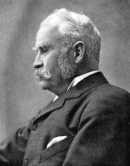
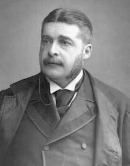
Gilbert, who wrote the libretti for these operas, created fanciful "topsy-turvy" worlds where each absurdity is taken to its logical conclusion—fairies rub elbows with British lords, flirting is a capital offense, gondoliers ascend to the monarchy, and pirates emerge as noblemen who have gone astray. Sullivan, six years Gilbert's junior, composed the music, contributing memorable melodies that could convey both humor and pathos.
Their operas have enjoyed broad and enduring international success and are still performed frequently throughout the English-speaking world. Gilbert and Sullivan introduced innovations in content and form that directly influenced the development of musical theatre through the 20th century. The operas have also influenced political discourse, literature, film and television and have been widely parodied and pastiched by humorists. Producer Richard D'Oyly Carte brought Gilbert and Sullivan together and nurtured their collaboration. He built the Savoy Theatre in 1881 to present their joint works (which came to be known as the Savoy Operas) and founded the D'Oyly Carte Opera Company, which performed and promoted Gilbert and Sullivan's works for over a century.
Photo Source: commons.wikimedia.org
Photo Source: commons.wikimedia.org
Source: wikipedia.org/
"Girl Crazy"
- Music by George Gershwin, Lyrics by Ira Gershwin - Book by Guy Bolton and John McGowan
- Opened October 14, 1930 at the Alvin Theatre, (New York) and ran for 272 performances.
- Performed at the Music Circus July 15 thru July 20, 1952
"Good News"
- Music and Lyrics by De Sylva, Brown and Henderson - Book by Lawrence Schwab, BG DeSylva, and Frank Mandel
- Originally produced by Music Theatre of Wichita, Inc.
- Opened September 6, 1927 at the Chanin's 46th Street Theatre, (New York) and ran for 551 performances.
- Performed at the Music Circus September 5 thru September 10, 1950
Source: www.nodanw.com/
"The Great Waltz"
- Adaptation of "Waltzes from Vienna" by Moss Hart, Frank Tours and Robert Russell Bennet
- Originally produced by Music Theatre of Wichita, Inc.
- Opened September 22, 1934 at the Center Theatre, (New York).
- Performed at the Music Circus July 4 thru July 9, 1950
Source: www.nodanw.com/
"Guys and Dolls"
- Music and Lyrics by Frank Loesser - Book by Jo Swerling and Abe Burrows
- Opened November 24, 1950 at the 46th Street Theatre, (New York) and ran for 1200 performances.
- Performed at the Music Circus August 23 thru September 4, 1955
- Performed at the Music Circus August 14 thru August 19, 1962
Enter Sky Masterson, a high-rolling gambler willing to take on any honest bet with a high enough reward attached. Nathan bets Sky that he can't take the "doll" of Nathan's choosing to Havana, Cuba, with him on a date. When Sky agrees to the bet, Nathan chooses uptight Evangelist Sergeant Sarah Brown, head of Broadway's Save-a-Soul Mission. Sky thinks he's been duped, but he's in for even more of a surprise when his efforts to woo Sarah are so successful that he falls in love with her himself! Guys and Dolls takes us from the bustle of Times Square to the dance clubs of Havana to the sewers of New York City as it demonstrates the great lengths to which a guy will go when he truly falls in love with a "doll."
"Gypsy"
- Music by Jule Styne - Lyrics by Stephen Sondheim - Book by Arthur Laurents
- Suggested by the Memoirs of Gypsy Rose Lee.
- Opened May 21, 1959 at the Broadway Theatre, (New York) and ran for 702 Perfomances.
- Performed at the Music Circus June 7 thru June 18, 1961
- Performed at the Music Circus July 3 thru July 8, 1962
Louise becomes the most famous of all strippers, Gypsy Rose Lee, following Rose's advice to never take it all off, and a glamorous figure with intellectual pretensions in celebrity society of the 1930s-1940s era. It was the heartbreak chapters of her best-selling memoirs that suggested a backstage musical show without the usual happy ending expected by Broadway audiences. "Gypsy" lost out in the 1960 Tony competition for best musical to "The Sound of Music."
As the final curtain falls on "Gypsy," Louise has left her mother in the dust, having told her that all she ever wanted was for her mother to notice her. Rose also is given a chance to explain herself in "Rose's Turn," a haunting song sung on a bare stage in which she laments what she might have been in the theater if she had not been "born too soon and started too late."
Source: www.areaguide.net/
"Happy Hunting"
- Music by Harold Karr - Lyrics by Matt Dubey - Book by Russel Crouse and Howard Lindsay
- Opened December 6, 1956 at the Majestic Theatre and ran for 412 performances.
- Performed at the Music Circus August 5 thru August 17, 1958
"High Button Shoes"
- Music by Jule Styne - Lyrics by Sammy Cahn - Book by Stephen Longstreet
- Opened October 9, 1947 at the New Century Theatre and ran for 727 performances.
- Performed at the Music Circus 1951
- Performed at the Music Circus September 15 thru September 20, 1953
- Performed at the Music Circus July 18 thru July 23, 1961
As the con men Floy and Pontdue are pursued to the Atlantic City beach while carrying a satchel full of stolen money, the people on the beach dance around them ("The Bathing Beauty Ballet"). They tangle with a large number of people—including bathing beauties, lifeguards, other criminals, identical twins—and one gorilla. The climax occurs when the Keystone Cops arrive, and Floy loses everything when he bets on the wrong football team.
"Hit the Deck"
- Music by Vincent Youmans - Lyrics by Clifford Grey and Leo Robin - Book by Herbert Fields
- Opened April 25, 1927 at the Belasco Theatre, New York and ran for 352 performances.
- Performed at the Music Circus August 22 thru August 27, 1950
Source: www.nodanw.com/
"How to Succeed in Business Without Really Trying"
- Music and Lyrics by Frank Loesser - Book by Abe Burrows, Jack Weinstock and Willie Gilbert
- Based on the novel by Shepherd Mead
- Opened October 14, 1961 at the 46th Street Theatre, New York and ran for 1,417 performances.
- Performed at the Music Circus July 5 thru July 17, 1966
"Irene"
- Music by Harry Tierney - Lyrics by Joseph McCarthy - Book by James Montgomery
- Opened November 18, 1919 at the Vanderbilt Theatre, New York and ran for 675 performances.
- Performed at the Music Circus 1951
Irene O'Dare helps her widowed mother in a little music shop in New York City. She's not unhappy, but she feels there must be more to life than this - the world, she says, must be bigger than Ninth Avenue. Against all tradition, she intends to be a successful business woman. In fact, she installs a telephone in the shop - the first in the neighbourhood. And the very first time the phone rings, Irene is asked to tune the pianos at a very swanky Long Island house. There she meets Donald Marshall, a young tycoon, and despite his rather aloof manner, she is immediately captivated by him. Donald is intrigued by this cheerful lass, so unlike the society girls his mother has been urging him to marry. He is particularly taken by her description of her adventures when she wore her favourite dress - her 'Alice Blue Gown'.
Donald's addle-pated cousin Ozzie arrives with a new idea. He wants to open a dress salon, to be run by a wild eccentric who calls himself Madame Lucy. Donald agrees to finance the project, with the proviso that his new discovery, Irene O'Dare.. shall take charge of the business. She is a great success a t this, and some of her Ninth Avenue friends are taken on at the salon as models, under the tuition of Madame Lucy. It is arranged that Madame Lucy's fashions are to be introduced at a society ball, where, to impress the gathering, Irene is announced as the Contessa Irena O'Dari. She captivates everyone with her Continental chic. But when Donald insists that she continue to play the role for business purposes, Irene is outraged. She will not live a lie, for Donald or anyone else. She reflects that 'I'm Always Chasing Rainbows'. Her Ninth Avenue friends cheer her up with the rousing and spectacular number 'Irene'.
At a party at the Marshall house, Donald confesses his love for Irene with 'You Made Me Love You'. Mrs. O'Dare suddenly meets the man who was her own long-lost love - none other than Madame Lucy. And Donald introduces the lovely Contessa O'Dari as the girl he will marry - Irene O'Dare.
"Irma La Douce"
- Irma la Douce is a 1956 French stage musical. Music by Marguerite Monnot - Book and Lyrics by Alexandre Breffort.
- Opened in July 1958 in London's West End and ran for 1512 performances..
- Opened in September 1960 in New York and ran for 524 performances.
- Performed at the Music Circus August 13 thru August 18, 1963
The London production starred Elizabeth Seal in the title role, Keith Michell as Nestor and Clive Revill as Bob-le-Hotu, the narrator, and ran for 1512 performances. The show transferred to Broadway in September 1960 with the same three lead actors, winning Elizabeth Seal the 1961 Tony Award for Best Actress in a Musical, and ran for 524 performances.
"Jamaica"
- Music by Harold Arlen - Lyrics by E.Y. Harburg - Book by E.Y. Harburg and Fred Saidy
- Opened in October 31, 1957 at the Imperial Theater (New York) and ran for 555 performances.
- Performed at the Music Circus July 28 thru August 9, 1959
"Jewel Box Revue"
- Performed at the Music Circus August 18 thru August 23, 1969
A recent and insightful paper by Mara Dauphin argues that the early drag/female impersonation revues of the 1940s and 1950s were "highly instrumental in creating queer communities and carving out queer niches of urban landscape in post-war America that would flourish into the sexual revolution of the sixties." And though there were other popular female impersonation clubs, such the famous Finnochio's in San Francisco and the infamous mafia-owned Club 82 of New York City, with the exception of the Jewel Box Revue, all the revues were operated and controlled by straight people, who were not always very gay-friendly (a notable exception being the Garden of Allah cabaret in Seattle, which featured the Jewel Box Revue as their opening-night act in 1946). Robin Raye, who performed in several early establishments, including Finocchio's and the Jewel Box Revue, once said of Mrs. Finocchio, "I don't think she liked gay people, but she certainly knew how to use them."
Consequently, my own research and interviews with several cast members of the Jewel Box Revue reveal Danny Brown and Doc Brenner as being some pretty tough customers who knew how to handle themselves in a fight, but who were also incredibly protective of the revue, which they considered family. In fact, both Danny's mother and Doc's mother were known to travel with the show.
Creating America's first gay community was not what Danny and Doc initially had in mind when they created the revue. They felt that Vaudeville had sidelined female impersonation acts into little more than burlesque shows, and both were passionate about reviving drag as an art form. Danny and Doc also intentionally catered the show to a heterosexual audience and tried their best to be viewed as legitimate entertainment by locals and authorities, to stay clear of any legal charges of sexual deviance. But behind the protective spin of publicity, it cannot be denied that the revue fostered one of the first gay-positive communities in America, if not the first. It was a place where "gayness" was accepted before the concept of gay-identity had even been fully conceived. Tobi Marsh, who joined the revue as a rebellious teenager in the late 1950s, viewed Danny and Doc not only as his bosses but as no-nonsense parental figures. Their over-protective nature agitated Tobi at the time, but his agitation would later grow into a grudging respect, as Danny and Doc took great efforts to protect him and the other members of the revue from the often brutal homophobic realities of life in the pre-Stonewall era.
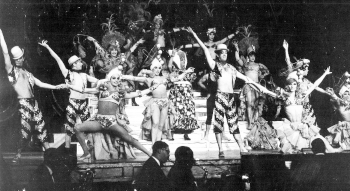
In the end Danny Brown and Doc Benner were successful and saw their dreams of reviving female impersonation as an art form come to fruition. The Jewel Box Revue became very successful and toured throughout the country for over three decades, even headlining at famed venues like the Apollo in New York City. But their contributions resonate far beyond their impacts on the field of female impersonation. In a very real sense Danny and Doc are the true godfathers of the modern gay community. The show was billed as "25 Men and 1 Woman," but hundreds of gay entertainers and female impersonator would come to work with the revue over the years, and their influence on the burgeoning gay rights movement still resonates to this very day, one particular performer somewhat more so than others. The African-American lesbian drag king Storme Delarvarie was the "1 Woman" of the Jewel Box Revue. She spent decades living, working and traveling with Danny and Doc's tough but protective community of touring entertainers. Those experiences and life lessons would prove invaluable in Storme's later life, and her actions continue to inspire generations of gay people. Storme Delarvarie is credited as being one of the first people to bravely fight back against the police as they raided the Stonewall Inn in New York City on the night of June 27, 1969. Her courage helped to spark a riot that begat the modern gay rights movement.
"The King and I"
- Music by Richard Rodgers - Book and Lyrics by Oscar Hammerstein II
- Based on Margaret Landon's novel, Anna and the King of Siam
- Opened in March 29, 1951 at the St. James Theatre (New York) and ran for 1246 performances.
- Performed at the Music Circus 1956
- Performed at the Music Circus August 29 thru September 3, 1961
- Performed at the Music Circus May 29 thru June 6, 1965
"Kismet"
- Music and Lyrics by Robert Wright, George Forrest (music adapted from Alexander Borodin) - Book by Luther Davis, Charles Lederer
- Based on Edward Noblock's 1911 play, "Kismet"
- Opened in December 3, 1953 at the Ziegfeld Theatre (New York) and ran for 583 performances.
- Performed at the Music Circus September 6 thru October 2, 1955
- Performed at the Music Circus June 8 thru June 13, 1965
"Kiss Me, Kate"
- Music and Lyrics by Cole Porter - Book by Bella and Samuel Spewack
- Opened in December 30, 1948 at the New Century Theatre (then the Shubert Theatre) (New York) and ran for 1077 performances.
- Performed at the Music Circus August 12 thru August 24, 1952
- Performed at the Music Circus August 17 thru August 22, 1954
- Performed at the Music Circus June 16 thru June 21, 1964
The musical was inspired by the on-stage/off-stage battling of husband-and-wife actors Alfred Lunt and Lynn Fontanne during their 1935 production of "The Taming of the Shrew," witnessed by future Broadway producer Arnold Saint-Subber. In 1947, he asked the Spewacks (undergoing their own marital woes at the time) to write the script; Bella Spewack in turn enlisted Cole Porter to write the music and lyrics.
"Li'l Abner"
- Music by Gene De Paul - Lyrics by Johnny Mercer - Book by Norman Panama and Melvin Frank
- Opened in November 15, 19568 at the St. James Theatre (New York) and ran for 693 performances.
- Performed at the Music Circus September 15 thru September 27, 1959
Guided and guarded by traveling preacher Marryin' Sam, Li'l Abner travels to Washington, DC, where he tangles with a gaggle of goofy scientists, unscrupulous capitalist General Bullmoose, and scheming minx Appassionata Von Climax. Suspense builds in a Cornpone Meeting, the romantic free-for-all that is the Sadie Hawkins Day race--where the girls put on their running shoes to catch themselves a groom--and the shenanigans that ensue when a snooty Washington, DC, engagement party is invaded by Hillbillies. Based on Andy Capp's beloved comic strip, with clever book by Norman Panama and Melvin Frank, and catchy score by Johnny Mercer and Gene de Paul, Li'l Abner is a rousing, bombastic, tuneful American musical, which is equal parts slapstick comedy, knowing government satire, and tale of young love.
